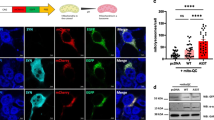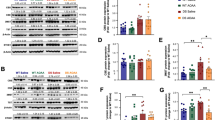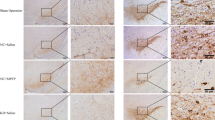Abstract
Huntington’s disease (HD) is characterized by cognitive and psychiatric impairment caused by neuronal degeneration in the brain. Several studies have supported the hypothesis that oxidative stress is the main pathogenic factor in HD. The current study aims to determine the possible neuroprotective effects of nicotinamide on 3-nitropropionic acid (3-NP) induced HD. Male Wistar albino rats were divided into six groups. Group I was the vehicle-treated control, group II received 3-NP (20 mg/kg, intraperitoneally (i.p.) for 4 days, group III received nicotinamide (500 mg/kg, i.p.). The remaining groups received a combination of 3-NP plus nicotinamide 100, 300 or 500 mg/kg, i.p. respectively for 8 days. Afterward, the motor function and hind paw activity in the limb withdrawal were tested; rats were then euthanized for biochemical and histopathological analyses. Treatment of rats with 3-NP altered the motor function, elevated oxidative stress and caused significant histopathological changes in the brain. The treatment of rats with nicotinamide (100, 300 and 500 mg/kg) improved the motor function tested by locomotor activity test, movement analysis, and limb withdrawal test, which was associated with decreased oxidative stress markers (malondialdehyde, nitrites) and increased antioxidant enzyme (glutathione) levels. In addition, nicotinamide treatment decreased lactate dehydrogenase and prevented neuronal death in the striatal region. Our study, therefore, concludes that antioxidant drugs like nicotinamide might slow progression of clinical HD and may improve the motor functions in HD patients. To the best of our knowledge, this study is the first to explore the neuroprotective effects of nicotinamide on 3-NP-induced HD.









Similar content being viewed by others
References
Anderson DW, Bradbury KA, Schneider JS (2008) Broad neuroprotective profile of nicotinamide in different mouse models of MPTP-induced parkinsonism. Eur J Neurosci 28:610–617
Andreassen OA, Dedeoglu A, Stanojevic V, Hughes DB, Browne SE, Leech CA, Ferrante RJ, Habener JF, Beal MF, Thomas MK (2002) Huntington's disease of the endocrine pancreas: insulin deficiency and diabetes mellitus due to impaired insulin gene expression. Neurobiol Dis 11:410–424
Aziz NA, van der Burg JM, Landwehrmeyer GB, Brundin P, Stijnen T, Group ES, Roos RA (2008) Weight loss in Huntington disease increases with higher CAG repeat number. Neurology 71:1506–1513
Beal MF, Brouillet E, Jenkins BG, Ferrante RJ, Kowall NW, Miller JM, Storey E, Srivastava R, Rosen BR, Hyman BT (1993) Neurochemical and histologic characterization of striatal excitotoxic lesions produced by the mitochondrial toxin 3-nitropropionic acid. J Neurosci 13:4181–4192
Behrens MI, Koh J, Canzoniero LM, Sensi SL, Csernansky CA, Choi DW (1995) 3-Nitropropionic acid induces apoptosis in cultured striatal and cortical neurons. Neuroreport 6:545–548
Belenky P, Bogan KL, Brenner C (2007) NAD+ metabolism in health and disease. Trends Biochem Sci 32:12–19
Beneke S, Burkle A, (2004) Poly(ADP-ribosyl)ation, PARP, and aging, Sci aging knowledge environ, 2004:re9
Bhateja DK, Dhull DK, Gill A, Sidhu A, Sharma S, Reddy BV, Padi SS (2012) Peroxisome proliferator-activated receptor-alpha activation attenuates 3-nitropropionic acid induced behavioral and biochemical alterations in rats: possible neuroprotective mechanisms. Eur J Pharmacol 674:33–43
Bogan KL, Brenner C (2008) Nicotinic acid, nicotinamide, and nicotinamide riboside: a molecular evaluation of NAD+ precursor vitamins in human nutrition. Annu Rev Nutr 28:115–130
Borlongan CV, Koutouzis TK, Sanberg PR (1997) 3-Nitropropionic acid animal model and Huntington's disease. Neurosci Biobehav Rev 21:289–293
Burkle A, Diefenbach J, Brabeck C, Beneke S (2005) Ageing and PARP. Pharmacol Res 52:93–99
Chidambaram SB, Vijayan R, Sekar S, Mani S, Rajamani B, Ganapathy R (2017) Simultaneous blockade of NMDA receptors and PARP-1 activity synergistically alleviate immunoexcitotoxicity and bioenergetics in 3-nitropropionic acid intoxicated mice: evidences from memantine and 3-aminobenzamide interventions. Eur J Pharmacol 803:148–158
Ellman GL (1959) Tissue sulfhydryl groups. Arch Biochem Biophys 82:70–77
Endres M, Wang ZQ, Namura S, Waeber C, Moskowitz MA (1997) Ischemic brain injury is mediated by the activation of poly(ADP-ribose)polymerase. J Cereb Blood Flow Metab 17:1143–1151
Fricker RA, Green EL, Jenkins SI, Griffin SM (2018) The influence of nicotinamide on health and disease in the central nervous system. Int J Tryptophan Res 11:1178646918776658
Gil-Mohapel J, Brocardo PS, Christie BR (2014) The role of oxidative stress in Huntington's disease: are antioxidants good therapeutic candidates? Curr Drug Targets 15:454–468
Gornall AG, Bardawill CJ, David MM (1949) Determination of serum proteins by means of the biuret reaction. J Biol Chem 177:751–766
Green LC, Wagner DA, Glogowski J, Skipper PL, Wishnok JS, Tannenbaum SR (1982) Analysis of nitrate, nitrite, and [15N]nitrate in biological fluids. Anal Biochem 126:131–138
Hauck AK, Bernlohr DA (2016) Oxidative stress and lipotoxicity. J Lipid Res 57:1976–1986
Higdon A, Diers AR, Oh JY, Landar A, Darley-Usmar VM (2012) Cell signalling by reactive lipid species: new concepts and molecular mechanisms. Biochem J 442:453–464
Jamwal S, Kumar P (2016) Spermidine ameliorates 3-nitropropionic acid (3-NP)-induced striatal toxicity: possible role of oxidative stress, neuroinflammation, and neurotransmitters. Physiol Behav 155:180–187
Jia H, Li X, Gao H, Feng Z, Li X, Zhao L, Jia X, Zhang H, Liu J (2008) High doses of nicotinamide prevent oxidative mitochondrial dysfunction in a cellular model and improve motor deficit in a Drosophila model of Parkinson's disease. J Neurosci Res 86:2083–2090
Kauppinen TM, Swanson RA (2007) The role of poly(ADP-ribose) polymerase-1 in CNS disease. Neuroscience 145:1267–1272
Kim Y, Kim YS, Noh MY, Lee H, Joe B, Kim HY, Kim J, Kim SH, Park J (2017) Neuroprotective effects of a novel poly (ADP-ribose) polymerase-1 inhibitor, JPI-289, in hypoxic rat cortical neurons. Clin Exp Pharmacol Physiol 44:671–679
Klaidman L, Morales M, Kem S, Yang J, Chang ML, Adams JD Jr (2003) Nicotinamide offers multiple protective mechanisms in stroke as a precursor for NAD+, as a PARP inhibitor and by partial restoration of mitochondrial function. Pharmacology 69:150–157
Kumar P, Kumar A (2009) Possible role of sertraline against 3-nitropropionic acid induced behavioral, oxidative stress and mitochondrial dysfunctions in rat brain. Prog Neuro-Psychopharmacol Biol Psychiatry 33:100–108
Kumar A, Ratan RR (2016) Oxidative stress and Huntington's disease: the good. The Bad, and The Ugly, J Huntingtons Dis 5:217–237
Kumar P, Padi SS, Naidu PS, Kumar A (2007) Cyclooxygenase inhibition attenuates 3-nitropropionic acid-induced neurotoxicity in rats: possible antioxidant mechanisms. Fundam Clin Pharmacol 21:297–306
Kumar P, Kalonia H, Kumar A (2010) Protective effect of sesamol against 3-nitropropionic acid-induced cognitive dysfunction and altered glutathione redox balance in rats. Basic Clin Pharmacol Toxicol 107:577–582
Lafon-Cazal M, Pietri S, Culcasi M, Bockaert J (1993) NMDA-dependent superoxide production and neurotoxicity. Nature 364:535–537
Lalic NM, Maric J, Svetel M, Jotic A, Stefanova E, Lalic K, Dragasevic N, Milicic T et al (2008) Glucose homeostasis in Huntington disease: abnormalities in insulin sensitivity and early-phase insulin secretion. Arch Neurol 65:476–480
Liu D, Pitta M, Jiang H, Lee JH, Zhang G, Chen X, Kawamoto EM, Mattson MP (2013) Nicotinamide forestalls pathology and cognitive decline in Alzheimer mice: evidence for improved neuronal bioenergetics and autophagy procession. Neurobiol Aging 34:1564–1580
Love S, Barber R, Wilcock GK (1999) Increased poly(ADP-ribosyl)ation of nuclear proteins in Alzheimer's disease. Brain 122(Pt 2):247–253
Ludolph AC, He F, Spencer PS, Hammerstad J, Sabri M (1991) 3-Nitropropionic acid-exogenous animal neurotoxin and possible human striatal toxin. Can J Neurol Sci 18:492–498
MacDermott AB, Mayer ML, Westbrook GL, Smith SJ, Barker JL (1986) NMDA-receptor activation increases cytoplasmic calcium concentration in cultured spinal cord neurones. Nature 321:519–522
Mock JT, Chaudhari K, Sidhu A, Sumien N (2017) The influence of vitamins E and C and exercise on brain aging. Exp Gerontol 94:69–72
Mokudai T, Ayoub IA, Sakakibara Y, Lee EJ, Ogilvy CS, Maynard KI (2000) Delayed treatment with nicotinamide (vitamin B(3)) improves neurological outcome and reduces infarct volume after transient focal cerebral ischemia in Wistar rats. Stroke 31:1679–1685
Morales J, Li L, Fattah FJ, Dong Y, Bey EA, Patel M, Gao J, Boothman DA (2014) Review of poly (ADP-ribose) polymerase (PARP) mechanisms of action and rationale for targeting in cancer and other diseases. Crit Rev Eukaryot Gene Expr 24:15–28
Nam E-J, Lee Y-J, Oh Y-A, Jung J-A, Im H-I, Koh S-E, Maeng S-H, Joo W-S et al (2003) Involvement of oxidative stress and poly(ADP-ribose) polymerase activation in 3-Nitropropionic acid-induced cytotoxicity in human neuroblastoma cells. Korean J Physiol Pharmacol 7:325–331
Nony PA, Scallet AC, Rountree RL, Ye X, Binienda Z (1999) 3-Nitropropionic acid (3-NPA) produces hypothermia and inhibits histochemical labeling of succinate dehydrogenase (SDH) in rat brain. Metab Brain Dis 14:83–94
Olsen C, Rustad A, Fonnum F, Paulsen RE, Hassel B (1999) 3-Nitropropionic acid: an astrocyte-sparing neurotoxin in vitro. Brain Res 850:144–149
Pallos J, Bodai L, Lukacsovich T, Purcell JM, Steffan JS, Thompson LM, Marsh JL (2008) Inhibition of specific HDACs and sirtuins suppresses pathogenesis in a Drosophila model of Huntington's disease. Hum Mol Genet 17:3767–3775
Park SD, Kim CG, Kim MG (1983) Inhibitors of poly(ADP-ribose) polymerase enhance DNA strand breaks, excision repair, and sister chromatid exchanges induced by alkylating agents. Environ Mutagen 5:515–525
Paulsen JS, Ready RE, Hamilton JM, Mega MS, Cummings JL (2001) Neuropsychiatric aspects of Huntington's disease. J Neurol Neurosurg Psychiatry 71:310–314
Sanberg PR, Fibiger HC (1979) Body weight, feeding, and drinking behaviors in rats with kainic acid-induced lesions of striatal neurons--with a note on body weight symptomatology in Huntington's disease. Exp Neurol 66:444–466
Scallet AC, Nony PL, Rountree RL, Binienda ZK (2001) Biomarkers of 3-nitropropionic acid (3-NPA)-induced mitochondrial dysfunction as indicators of neuroprotection. Ann N Y Acad Sci 939:381–392
Scallet AC, Haley RL, Scallet DM, Duhart HM, Binienda ZK (2003) 3-nitropropionic acid inhibition of succinate dehydrogenase (complex II) activity in cultured Chinese hamster ovary cells: antagonism by L-carnitine. Ann N Y Acad Sci 993:305–312 discussion 345-309
Schulz JB, Henshaw DR, MacGarvey U, Beal MF (1996) Involvement of oxidative stress in 3-nitropropionic acid neurotoxicity. Neurochem Int 29:167–171
Silva-Palacios A, Ostolga-Chavarria M, Buelna-Chontal M, Garibay C, Hernandez-Resendiz S, Roldan FJ, Flores PL, Luna-Lopez A et al (2017) 3-NP-induced Huntington's-like disease impairs Nrf2 activation without loss of cardiac function in aged rats. Exp Gerontol 96:89–98
Spector R (1979) Niacin and niacinamide transport in the central nervous system. In vivo studies, J Neurochem 33:895–904
Stoica BA, Loane DJ, Zhao Z, Kabadi SV, Hanscom M, Byrnes KR, Faden AI (2014) PARP-1 inhibition attenuates neuronal loss, microglia activation and neurological deficits after traumatic brain injury. J Neurotrauma 31:758–772
Sumien N, Chaudhari K, Sidhu A, Forster MJ (2013) Does phytoestrogen supplementation affect cognition differentially in males and females? Brain Res 1514:123–127
Surjana D, Halliday GM, Damian DL (2010) Role of nicotinamide in DNA damage, mutagenesis, and DNA repair. J Nucleic Acids 2010:157591. https://doi.org/10.4061/2010/157591
Tariq M, Khan HA, Elfaki I, Al Deeb S, Al Moutaery K (2005) Neuroprotective effect of nicotine against 3-nitropropionic acid (3-NP)-induced experimental Huntington's disease in rats. Brain Res Bull 67:161–168
Tunez I, Tasset I, Perez-De La Cruz V, Santamaria A (2010) 3-Nitropropionic acid as a tool to study the mechanisms involved in Huntington's disease: past, present and future. Molecules 15:878–916
Turunc Bayrakdar E, Uyanikgil Y, Kanit L, Koylu E, Yalcin A (2014) Nicotinamide treatment reduces the levels of oxidative stress, apoptosis, and PARP-1 activity in Abeta(1-42)-induced rat model of Alzheimer's disease. Free Radic Res 48:146–158
Vinther-Jensen T, Larsen IU, Hjermind LE, Budtz-Jorgensen E, Nielsen TT, Norremolle A, Nielsen JE, Vogel A (2014) A clinical classification acknowledging neuropsychiatric and cognitive impairment in Huntington's disease. Orphanet J Rare Dis 9:114–122
Virag L, Szabo C (2002) The therapeutic potential of poly(ADP-ribose) polymerase inhibitors. Pharmacol Rev 54:375–429
Vis JC, Verbeek MM, De Waal RM, Ten Donkelaar HJ, Kremer HP (1999) 3-Nitropropionic acid induces a spectrum of Huntington's disease-like neuropathology in rat striatum. Neuropathol Appl Neurobiol 25:513–521
Waldvogel HJ, Kim EH, Tippett LJ, Vonsattel JP, Faull RL (2015) The neuropathology of Huntington's disease. Curr Top Behav Neurosci 22:33–80
Wills ED (1966) Mechanisms of lipid peroxide formation in animal tissues. Biochem J 99:667–676
Wullner U, Young AB, Penney JB, Beal MF (1994) 3-Nitropropionic acid toxicity in the striatum. J Neurochem 63:1772–1781
Zhu Y, Zhao KK, Tong Y, Zhou YL, Wang YX, Zhao PQ, Wang ZY (2016) Exogenous NAD(+) decreases oxidative stress and protects H2O2-treated RPE cells against necrotic death through the up-regulation of autophagy. Sci Rep 6:26322
Acknowledgements
This research did not receive any specific grant from funding agencies in the public, commercial, or not-for-profit sectors.
Author information
Authors and Affiliations
Corresponding author
Rights and permissions
About this article
Cite this article
Sidhu, A., Diwan, V., Kaur, H. et al. Nicotinamide reverses behavioral impairments and provides neuroprotection in 3˗nitropropionic acid induced animal model ofHuntington’s disease: implication of oxidative stress˗ poly(ADP˗ ribose) polymerase pathway. Metab Brain Dis 33, 1911–1921 (2018). https://doi.org/10.1007/s11011-018-0297-0
Received:
Accepted:
Published:
Issue Date:
DOI: https://doi.org/10.1007/s11011-018-0297-0




